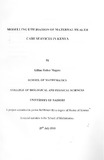| dc.description.abstract | Objectives: To better understand the individual and community factors and perceptions that influence women's health care-seeking behaviors during pregnancy in order to increase women's utilization of maternal health services.
Methods: This study investigates the demographic and sociocultural barriers that influence women's utilization of selected maternal health services in Kenya using the KDHS 2008/9 Data.
Results: Results reveal that the level of utilization of maternal health care services in Kenya is still low though strategies to improve the health care systems have improved. Adequate ANC use is at 49 per cent while Delivery care is at 44 per cent. Utilization of ANC services is influenced by a woman's age, geographical region, type of residence, religion, her ethnic backgroung and her education attainment.. For delivery care place of residence, region in the country, maternal education coupled with the partner's educational attainment and total children ever born greatly influences utilisation of this particular maternal health care service.
Conclusions: Evidence suggests that in order to improve maternal health utilization in Kenya there is need to provide focused and sustained health education that is geared towards promoting use of these selected maternal health care services; ANC, DC and postnatal care in the country. | en_US |

